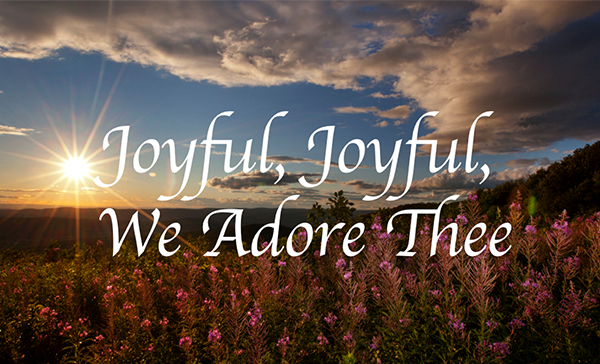
One of my favorite hymns to sing in corporate worship is the widely known and much beloved song of praise “Joyful, Joyful We Adore Thee.” Written by Henry Van Dyke at the turn of the twentieth century, the hymn's bright, uplifting melody compliments the author’s focus on the beauty of creation witnessing to God’s glory and our ultimate hope in the source of all joy, the triune God. Van Dyke wrote the lyrics to this famous hymn while serving as the guest preacher at Williams College, a school nestled in the beautiful Berkshire Mountains of north-western Massachusetts. The glory and majesty of this section of the Appalachian Mountains was the inspiration for this hymn of praise during the author’s stay at the college.
This hymn and the importance of joy in the Christian life has been on my mind since recently returning from the Youth Fall Retreat. I had a wonderful time spending the weekend with 55 middle and high school students and eight youth leaders at Camp Vesper Point. Like Van Dyke’s experience in the Berkshire Mountains, we were surrounded by God’s glory in creation. Amid the crisp fall air, the forest foliage seemed to explode with endless shades of browns, yellows, reds, and oranges along the banks of beautiful Chickamauga Lake. It was the perfect time for the CPC students to get away from the hustle and bustle and distractions of daily life and spend the weekend together in fellowship, worship, and the study of Scripture - all while being surrounded by the beauty of our Creator.
The hymn “Joyful, Joyful, We Adore Thee” has also been on my mind since our return because the theme for the Youth Retreat was “Joy in Christ.” Our speaker Tony Howard, Assistant Pastor of Chesterfield Presbyterian Church outside of St. Louis, MO, led us through a study of Paul’s epistle to the Philippians, focusing on the importance and necessity of joy in the Christian life. I was convicted and challenged as we studied this topic, because although I eagerly sing the words to “Joyful, Joyful” when the occasion arises in Sunday worship, I rarely take the time to stop and think about the areas of my life that are keeping me from finding a deeper, more constant joy in King Jesus. It’s an aspect of the Christian life I often neglect.
Yet during the Youth Retreat I was reminded that our calling to pursue joy in the Lord is not an optional add-on to the Christian life. Throughout his letters, when the apostle Paul speaks on this theme, he doesn’t offer mere suggestions. He issues commands: “Finally, brothers, rejoice” (2 Corinthians 13.11) and “Rejoice always” (1 Thessalonians 5.16). What’s even more surprising is that most of Paul’s references to joy occur in his letter to the Philippians. Paul uses “joy” or “rejoice” 14 times in Philippians - more than any other letter of his.
This is a significant and, indeed, shocking detail when we take into account the situation Paul is in when writing this letter. It was written during a time of incredible personal suffering for the apostle to the Gentiles. It’s one of the letters that New Testament scholars refer to a “Prison Epistle,” because Paul pens it from a Roman prison cell with the threat of execution hanging over him. Yet in spite of his dire circumstances, he urges the Philippian believers to “Be glad and rejoice with me” (Philippians 2.18); “Rejoice in the Lord” (3.1); and “Rejoice in the Lord always; again I will say, rejoice” (4.4). How can Paul, amid great hardship, find joy in Christ to the point where he can say, “For to me to live is Christ, and to die is gain” (1.21)?
He is able to say these famous words because he understands that the deep gladness to which we are called must be rooted in something deeper than the ever-changing circumstances of our lives. Indeed, for Paul, joy is rooted in something deeper than the prospect of imminent death. Paul’s joy, and the joy to which we are called, is anchored in the One who defeated death and is Lord over the seemingly unstable situations in which we often find ourselves.
Thus, as I reflect on the Youth Retreat, I’m both challenged and encouraged to live out the profound truths expressed in the great hymn, “Joyful, Joyful, We Adore Thee.” I’m also encouraged by a renewed sense of purpose and deeper understanding to pursue the Christian life not out of drudgery or lifeless obedience, but rather from a deep wellspring of joy that comes from a life centered on the One “who for the joy that was set before him endured the cross, despising its shame, and is seated at the right hand of God the Father” (Hebrews 12.2).







